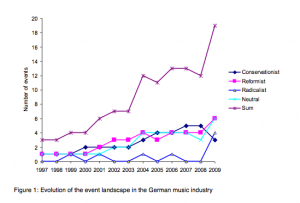This paper session reviewed the impact of Creative Commons, the copyright law discourse in Germany and copyrights issues in Israel.
Tal Niv, UC Berkeley and Creative Commons, USA, outlined an upcoming study that will measure how Creative Commons adds value to society. What is the contribution of Creative Commons to art, basic science, user generated content and welfare? Creative Commons reduces transaction costs and contributes to the commons. We look forward to a successful conclusion of the study.
Copyright regulation discourse in Germany
Leonard Dobusch and Elke Schüßler from the „Freie Universität“ Berlin examined in their paper the discourse on copyright regulation. Their approach: conferences play a key role in shaping the development of a market. Therefore they conducted an event ecology analysis and a comparative in-depth discourse analysis of three key events, the popkomm, the c/o pop and the a2n. Generally, the event landscape indicates that the music industry suffers not from depression; on contrary, it´s a thriving industry.
(Schüßler, Dobusch, p. 12)
The authors classified the discourse into three groups:
– Conservative: The internet causes a crisis
– Reformist: Punishment will not work
– Radical: There is no such thing as intellectual property
There are two key findings of this paper. First, in mainstream media, conservative voices play a major role. Second, organizing „events are a powerful mechanism to influence the public copyright debate.”
Access to Knowledge: Israel Case Study
Dalit Ken-dror and Meital Duvdevani from the University of Haifa, Israel, discussed the balance of rights between users and creators in the Israeli Copyright. Israeli law changed to fair use doctrine. But within Israeli law one distinguished between Hohfeldian privilege (a person has the right to use the work in a fair sense, no one can prevent him/her from doing so) and Hohfeldian right (if a person has the right to use the work, he/she can force the author to make the work accessible). A recent lawsuit shifted the balance of copyright in this case towards the Hohfeldian right. Both authors believe, that this decision was too radical and could backfire. The Hohfeldian right, in their view, destroys the balance between the rights of users/creators. Both prefer an evolutionary approach in the reformation of copyright law.



 Die
Die